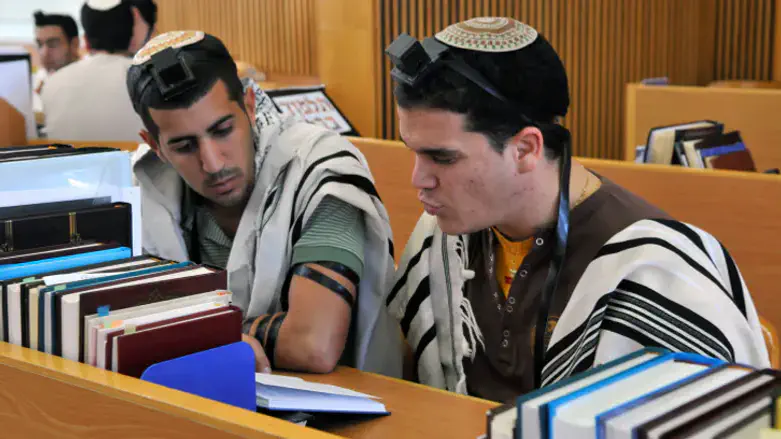
Once upon a time I began to write a screenplay for a Hollywood-style movie based on the Hanukah saga. My research took me from the Gemara to the Book of the Macabbees, Megillat Antiochus, Megillat Maaseh Hanukah, Misdrash Maaseh Yehudit, and Josephus. While some of the material is historically accurate, many of the tales no doubt border on historical fiction. Though far from their level, I, too, will take the literary liberty to add a scene of my own which has not yet been recorded but which could easily have occurred.
To capsulize the drama in the succinct style of a film review – when the Syrian-Greeks conquer the Land of Israel and impose their heathen laws and idolatrous practices upon the Israelites, polluting the Beit HaMikdash, prohibiting Jews from keeping fundamental Torah commandments, a despairing Matitiyahu abandons Jerusalem with his family and moves to Modiin. When a Greek commander arrives in Modiim to force Jews to sacrifice to the Greek gods, he orders the influential Matitiyahu to be the first idolater as an example for all the Jews to follow, saying:
“You are a leader and an honorable and great man in this city, and strengthened with sons and brethren: Now therefore come you first and fulfil the king’s commandment like all the heathen have done and the people of Yehuda also, and those who remain in Jerusalem. so that you and your house be numbered among the king’s friends, and you and your children shall be honored with silver and gold, and many rewards.”
Mattitiyahu answers with a loud voice, “Though all the nations that are under the king’s dominion obey him and renounce the religion of their fathers, and give consent to the king’s commandments, yet I and my sons and my brethren will walk in the Covenant of our fathers. Heaven forbid that we should forsake the Torah and its laws. We will not hearken to the king’s words to betray our religion, either on the right hand or the left.”
When a Jew who hopes to win favor from the Greeks strides forward to sacrifice, the distinguished and learned Matitiyahu rushes forward to slay him. After killing the Greek commander as well, Matitiyahu flees with his sons and followers to the mountain forests - and the rebellion begins.
The Book of the Macabbees relates than many religious Jews join the Macabbees in their mountain hiding places. One large group is spending the Shabbat in a large cave when a troop of Syrian-Greek soldiers arrives. The commander calls out: “Either surrender peacefully and obey our decrees or everyone will be killed.” The one-thousand Jews in the cave defiantly decide not to defend themselves in any way in order not to violate the Sabbath. The Greeks slaughter all of them. While the brief account of the massacre does not record the debate which must certainly have transpired within the cave as the Jews argued what to do, as is the custom amongst the Jews, it does not require great imagination to envision the emotional scene:
“I say we all die rather than profane the commandments of our Torah!” Aryeh declares.
“I disagree!” Ofir shouts. “The Torah commands us to fight for our lives! We must take up our swords and defend ourselves and our people and our sacred Land against enemies who have set upon us to conquer our Land and erase our Covenant with Hashem.” Boldly, in defiance of the Sabbath, he grabs his long sword and holds it high in the air. His followers cheer loudly.
“NO!” Aryeh cries out. “The Torah will defend us!”
Voices of assent sound throughout the cave, agreeing with Aryeh.
“The Torah and our swords will defend us! Not the Torah alone,” counters Ofir. “The Torah commands to take up arms against enemies who come to conquer our Land. The Torah commands us to rise up and kill those who come to kill us. The Torah commands us not to stand idly by the blood of our brethren!”
“Hashem will save us!” Aryeh shouts. “For the sake of our allegiance to Torah!”
“That is not the way of Torah!” Ofir argues. “Moshe Rabbeinu ordered the nation to war against enemies so that we live and not die. Yehoshua, who studied Torah day and night in the beit midrash of Moshe, took up the sword in defense of our nation and to conquer our Land. King David, the sweet singer of Israel, took up the sword and led the way into battle to slay the enemies of Hashem. Torah and sword. Safra veSayfa, the Book and the Sword. That is the true way of Torah and the Will of Hashem!”
A vote is taken. Aryeh wins by a small majority. During Shabbat the Jews in the cave study Torah with great fervor. The enemy attacks and all one-thousand Jews are slaughtered by the soldiers of Antiochus.
After this, the rabbis of the time give the decision to fight enemies on the Sabbath the status of a halakhic decsion for all time.
Let’s go back to the Book of Macabbees which states:
“Now when Mattitiyahu and his followers heard what had transpired, they mourned with deep grief. And one of them said to another, ‘If we do as our brethren have done, and fight not to defend our lives against the heathen, they will quickly erase us completely from the face of the earth.’ At that time therefore they decreed, saying, ‘Whosoever shall come to make battle with us on the Sabbath day, we will fight against him; we will we not be killed, as our brethren who were murdered in their place of hiding.’”
The message of the story? As a legendary actor of Hollywood teaches: “When you have to shoot – shoot.” There is a time for learning Torah and a time for fighting to save the Torah, Jewish lives and the Holy Land.